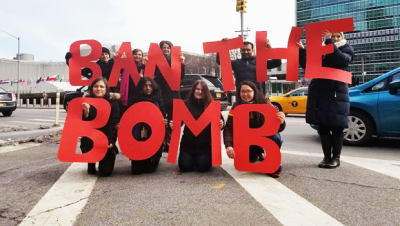The Nuclear Ban Treaty and Beyond. Will it Reduce Nuclear Arsenals and Defuse Nuclear Threats?
UNCA Media Briefing

UNCA media briefing with experts and parliamentarians on the ban treaty’s potential ramifications, the UN High Level Conference and related measures to eliminate nuclear weapons.
WHAT? A media briefing with nuclear experts, parliamentarians and a former UK naval commander, designed to help journalists cover the treaty to ban nuclear weapons, which non-nuclear weapons states are negotiating at the UN now.
Negotiations are on track, and will very likely achieve a treaty on or before July 7. That’s historic, but what will it mean practically? What impact could it have on nuclear weapons states and their allies who are not participating in the treaty, and what will it do to reduce nuclear arsenals and defuse nuclear threats?
That’s an urgent question, since growing conflict between Russia and NATO/European Union and increased tensions in North East Asia and South Asia have made nuclear risks more acute than any time since the Cuban Missile Crisis.
The ban treaty will strengthen the global norm against using nuclear weapons, but additional measures and forums, including the 2018 UN High Level Conference on Nuclear Disarmament, are necessary to move the nuclear armed States to phase out nuclear deterrence and negotiate comprehensive nuclear disarmament, say experts who will brief UNCA members and answer questions.
At the briefing presenters will release a new Parliamentary Action Plan for a Nuclear-Weapon-Free World developed by Parliamentarians for Nuclear Nonproliferation and Disarmament (PNND) in consultation with the Inter-Parliamentary Union (IPU). It outlines parliamentary actions that can implement the ban treaty in non-nuclear countries, and advance nuclear threat reduction and disarmament in nuclear-armed countries and allied countries, based primarily on the nuclear disarmament resolution adopted by the 130th Assembly of the IPU.
The Action Plan highlights opportunities provided by the 2018 UN High Level Conference on Nuclear Disarmament (UNHLC), which follows successful, impactful UNHLCs on sustainable development (2015), climate change (2016), refugees and migrants (2016) and oceans (2017).
Briefers will also discuss nuclear weapons divestment actions for which the ban treaty could provide additional impetus. Parliamentary and civil society action has already moved some countries (Norway, New Zealand and Lichtenstein) to curtail investments from their public funds in corporations that make nuclear weapons and their delivery systems. Some banks have been pressured to do the same.
The adoption of the ban treaty could lead to a global nuclear weapons divestment campaign, challenging the power of the nuclear weapons corporations which are influential and effective at lobbying for and extracting huge nuclear weapons budgets from their governments.
WHO? Experts presenting at the UNCA briefing will include:
- Commander Rob Green — British Royal Navy (Retired), co-director of the Peace Foundation’s Disarmament & Security Centre. He flew nuclear strike aircraft and was in charge of round-the-clock intelligence support for Polaris. He now advocates nuclear disarmament, using his military experience to promote alternative thinking about security.
- Bill Kidd – Member of the Scottish Parliament. Co-President of Parliamentarians for Nuclear Nonproliferation and Disarmament.
- Alyn Ware — Global Coordinator, Parliamentarians for Nuclear Non-Proliferation and Disarmament. Winner of the Right Livelihood Award and nominated for the Nobel Peace Prize.
- Jonathan Granoff — President Global Security Institute, UN representative for the Summits of Nobel Peace Laureates
WHEN & WHERE? The press briefing will take place on Wednesday, July 5 at 11:00am in the UNCA press room, United Nations Correspondents Association Meeting Room, Secretariat Building, New York, Third Floor, Room S-310. Side interviews are available on request. For more information, please contact Stephen Kent.
Featured image from International Campaign to Abolish Nuclear Weapons

